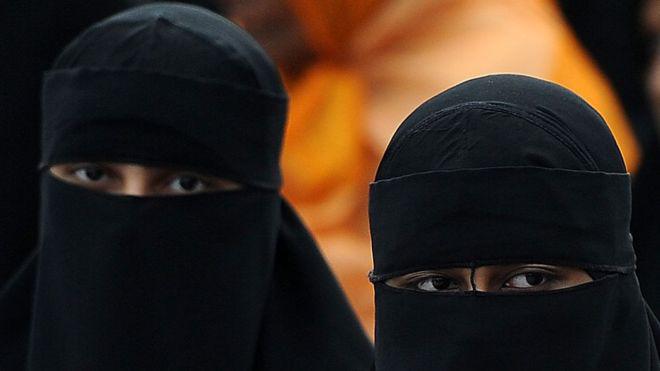
Sri Lanka attacks: Face coverings banned after Easter bloodshed
Sri Lanka has banned face coverings in public, following a spate of suicide attacks on Easter Sunday that killed at least 250 people and injured hundreds.
President Maithripala Sirisena said he was using an emergency law to impose the restriction from Monday.
Any face garment which "hinders identification" will be banned to ensure national security, his office said.
The niqab and burka - worn by Muslim women - were not specifically named.
The move is perceived as targeting the garments, however.
Sri Lanka remains on high alert eight days after Islamist attacks that hit churches and hotels.
Dozens of suspects have been arrested, but local officials warned that more militants remained at large.
How many people are affected?
Sri Lanka has a sizeable and centuries-old Muslim population - out of 21 million, just under 10% are Muslim.
Only a small number of women are thought to wear the face-covering niqab, or the burka - a one-piece veil that covers the face and body.
Last week a Sri Lankan MP had proposed a ban on women wearing the burqa, saying it should be outlawed on security grounds.
According to news outlet India Today, the All Ceylon Jamiyyathul Ulama, an organisation of Muslim clerics in Sri Lanka, had also asked women to avoid wearing face coverings.
Over the weekend thousands of Sri Lankan troops stood guard on the streets, protecting churches and mosques.
Sunday church services were cancelled across the country as a precaution, but worshippers in the capital gathered to pray outside St Anthony's Shrine, which was badly damaged in the attacks.
The number of people arrested in connection with the bloodshed rose to 150. Sri Lankan authorities are also hunting for around 140 followers of the jihadist group Islamic State, which has said it was involved in the bombings, but has not given details.
On Friday, the father and two brothers of the alleged organiser of the attacks, Zahran Hashim, were killed in an operation by security forces.
Hashim, who blew himself up at a hotel in Colombo, founded an Islamist group, the NTJ, which authorities have said was behind the attacks.
(BBC)

